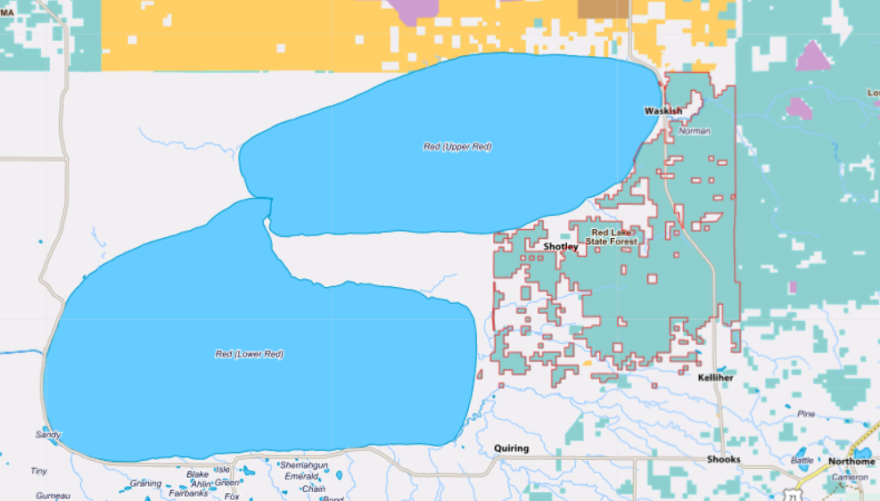WASKISH — A bill introduced Monday, March 11, in the Minnesota House of Representatives would transfer all state-owned property on Upper Red Lake and in the Red Lake State Forest to the Red Lake Nation.
Introduced by DFL Rep. Sydney Jordan of Minneapolis and six co-authors, the bill would require the Minnesota Department of Natural Resources to identify funding restrictions or other legal barriers to conveying the land and real property, such as buildings, to the tribe.
It also would appropriate $20 million next year to the DNR to fulfill the land transfer, including any land purchases necessary.

The Red Lake State Forest includes 84,105 acres of wooded land around the communities of Waskish, Shotley and Kelliher. In addition to state-held lands, there are several private homes and businesses — including resorts — around Upper Red, a popular walleye fishing destination. Lower Red Lake and the western portion of Upper Red are part of Red Lake Nation, and only tribal members have access.
The bill comes just weeks after Red Lake Tribal Chairman Darrell Seki reiterated in his State of the Band address the push to reclaim the disputed eastern boundary of the Red Lake Nation, which includes a 1-mile buffer around Upper Red’s shores.

“We will pursue these lands until it’s done,” Seki said. “The return of our lands that have been stolen from us by deceit and fraud.”
When the Red Lake Nation was first established as a reservation, the Red Lake chiefs presented a map in 1889 including the entirety of Upper and Lower Red lakes. A different map was approved by the federal government, which gave the eastern boundary to the state of Minnesota in the early 1900s.
On Wednesday, the Upper Red Lake Area Association shared a letter template for those concerned about the bill to send to legislators. The letter asks for careful consideration of the implications of the Land Back movement by displacing current landowners and disrupting existing economic activities.
"While I acknowledge the importance of addressing historical injustices and promoting the rights of Indigenous peoples, I believe that the proposed measures associated with the Land Back movement could have detrimental effects on both the local community and broader societal harmony," the letter reads.
" ... Any attempt to alter the status quo through the Land Back movement could disrupt the delicate balance that exists within the community and undermine the autonomy that the Red Lake Nation has fought so hard to maintain."
The association announced online Thursday it would change its regular monthly meeting location from West Wind Resort to the Waskish Town Hall. The meeting is 6 p.m. Tuesday, and the public is welcome, although the organization noted a larger town hall meeting is being planned for some time in April.
There is no companion legislation in the Minnesota Senate as of Thursday. The House bill was referred to the Environment and Natural Resources Finance and Policy Committee.
This is the second effort this legislative session to return lands back to tribal nations. A bill discussed in a hearing last week would turn over the White Earth State Forest to the White Earth Nation.
In a statement late Thursday afternoon, DFL state Sens. Grant Hauschild and Rob Kupec stated their opposition to the White Earth proposal. They said too many questions arise from the legislation, and it will not move forward in the Senate.
"We understand the desire of the involved parties to explore these options," the statement read. "However, public land transfers need to go through a rigorous process with the Department of Natural Resource[s], tribal nations, local community leaders, and other necessary parties to ensure the best outcome for all involved."




